Unit 4 Growing up Period 3课件(共30张PPT,含内嵌视频) 牛津译林版英语九年级上册
文档属性
| 名称 | Unit 4 Growing up Period 3课件(共30张PPT,含内嵌视频) 牛津译林版英语九年级上册 | 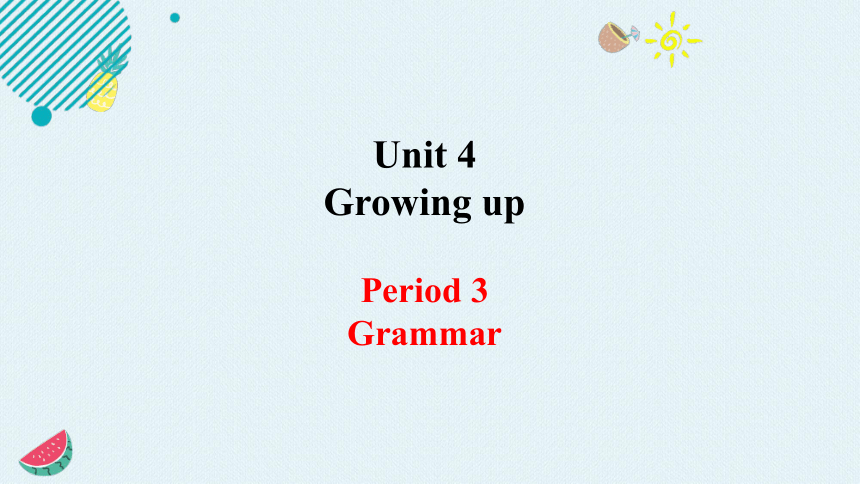 | |
| 格式 | pptx | ||
| 文件大小 | 5.7MB | ||
| 资源类型 | 教案 | ||
| 版本资源 | 牛津译林版 | ||
| 科目 | 英语 | ||
| 更新时间 | 2024-07-21 16:54:51 | ||
图片预览

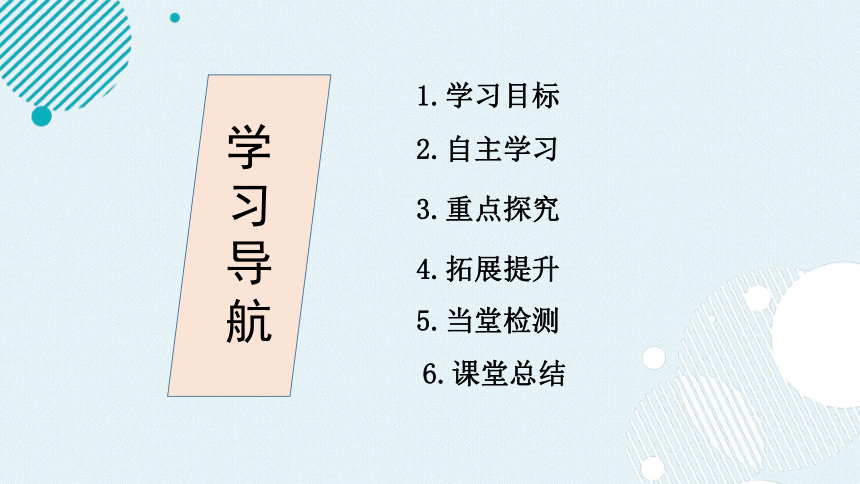


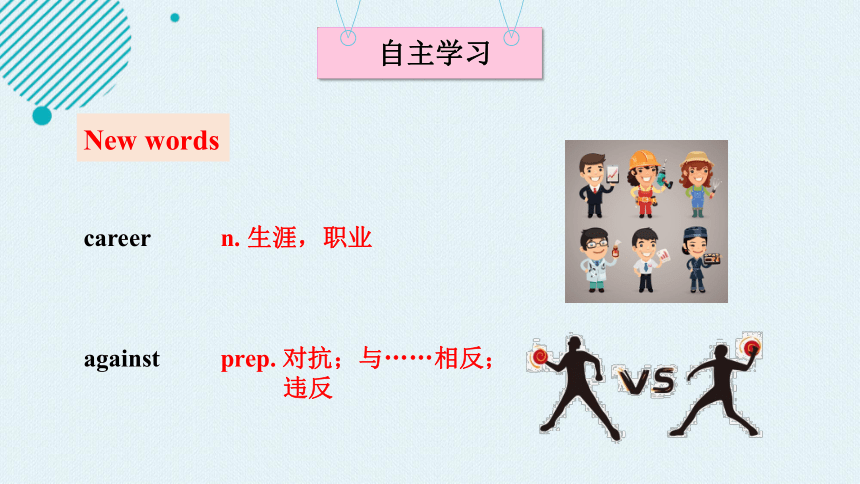
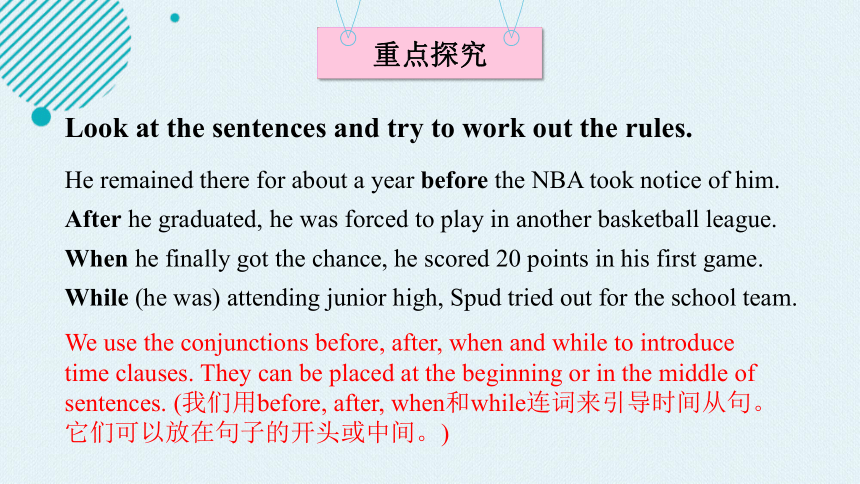
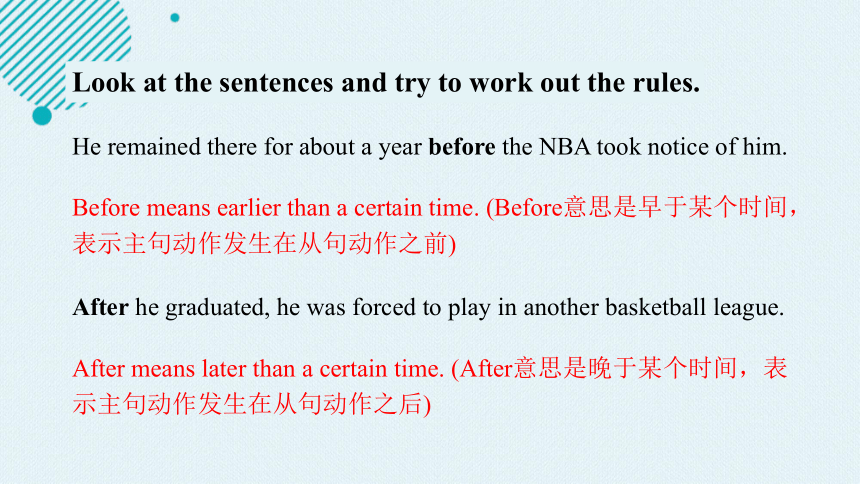
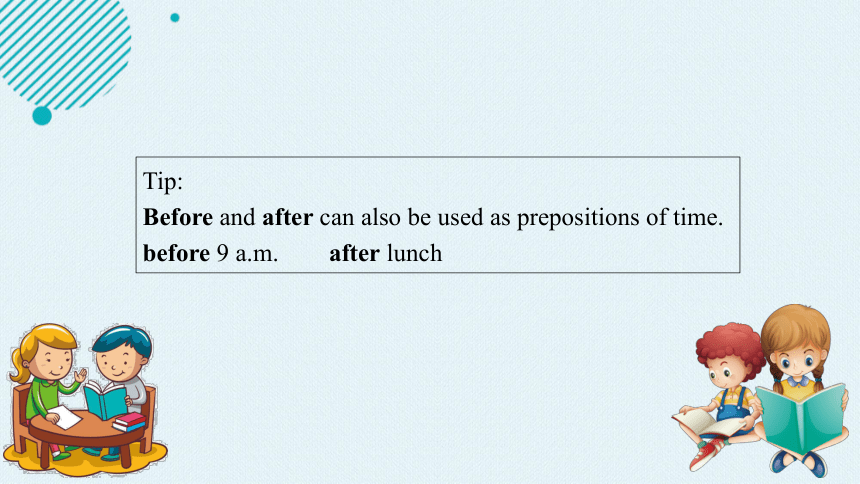
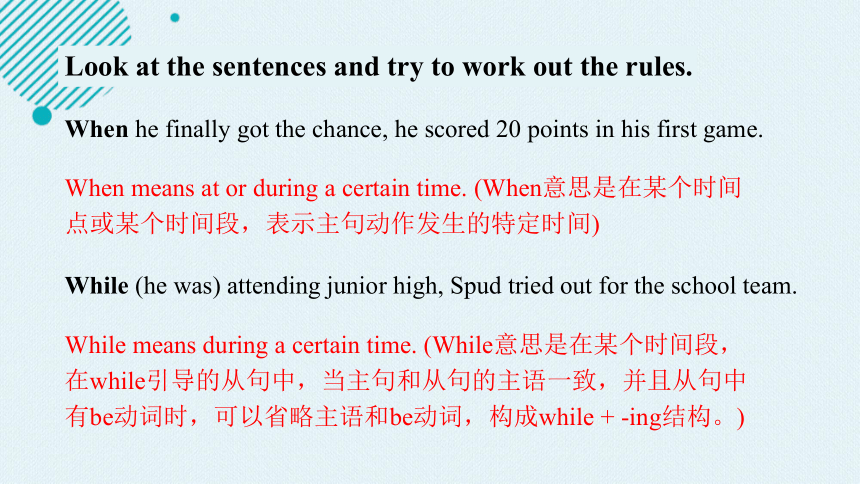
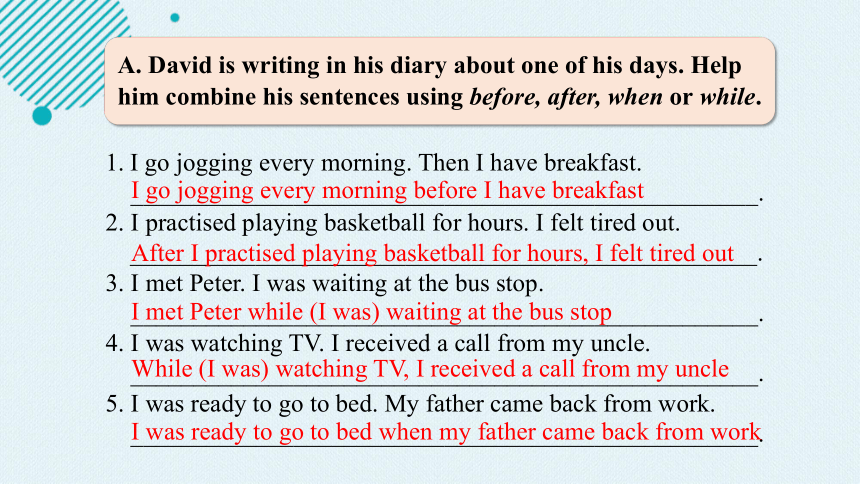
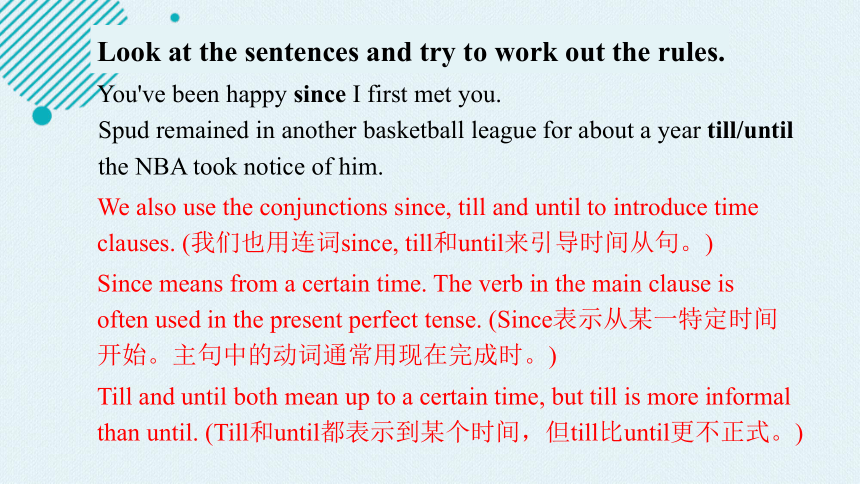
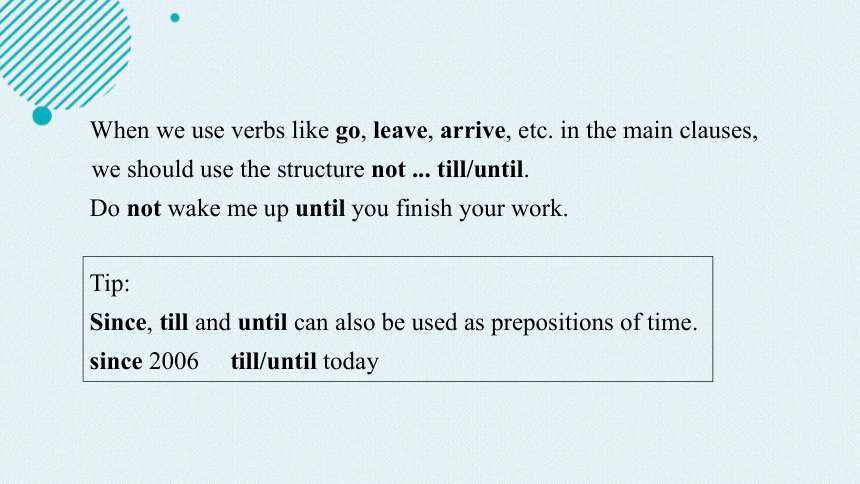
文档简介
(共30张PPT)
Unit 4
Growing up
Period 3
Grammar
1.学习目标
3.重点探究
2.自主学习
学习导航
5.当堂检测
6.课堂总结
4.拓展提升
新课导入
Video about time clauses
1.能熟悉并正确运用本课时的重点单词和短语。
2.能掌握before、after、when和while引导的时间状语从句。
3.能掌握since、till和until引导的时间状语从句。
4.能掌握as soon as和whenever引导的时间状语从句。
学习目标
New words
自主学习
career
against
n. 生涯,职业
prep. 对抗;与……相反;
违反
重点探究
Look at the sentences and try to work out the rules.
We use the conjunctions before, after, when and while to introduce time clauses. They can be placed at the beginning or in the middle of sentences. (我们用before, after, when和while连词来引导时间从句。它们可以放在句子的开头或中间。)
He remained there for about a year before the NBA took notice of him.
After he graduated, he was forced to play in another basketball league.
When he finally got the chance, he scored 20 points in his first game.
While (he was) attending junior high, Spud tried out for the school team.
Look at the sentences and try to work out the rules.
Before means earlier than a certain time. (Before意思是早于某个时间,表示主句动作发生在从句动作之前)
He remained there for about a year before the NBA took notice of him.
After he graduated, he was forced to play in another basketball league.
After means later than a certain time. (After意思是晚于某个时间,表示主句动作发生在从句动作之后)
Tip:
Before and after can also be used as prepositions of time.
before 9 a.m. after lunch
Look at the sentences and try to work out the rules.
When means at or during a certain time. (When意思是在某个时间点或某个时间段,表示主句动作发生的特定时间)
When he finally got the chance, he scored 20 points in his first game.
While (he was) attending junior high, Spud tried out for the school team.
While means during a certain time. (While意思是在某个时间段,在while引导的从句中,当主句和从句的主语一致,并且从句中有be动词时,可以省略主语和be动词,构成while + -ing结构。)
A. David is writing in his diary about one of his days. Help him combine his sentences using before, after, when or while.
I go jogging every morning. Then I have breakfast.
__________________________________________________.
2. I practised playing basketball for hours. I felt tired out. __________________________________________________.
3. I met Peter. I was waiting at the bus stop.
__________________________________________________.
4. I was watching TV. I received a call from my uncle.
__________________________________________________.
5. I was ready to go to bed. My father came back from work.
__________________________________________________.
I go jogging every morning before I have breakfast
After I practised playing basketball for hours, I felt tired out
I met Peter while (I was) waiting at the bus stop
While (I was) watching TV, I received a call from my uncle
I was ready to go to bed when my father came back from work
Look at the sentences and try to work out the rules.
We also use the conjunctions since, till and until to introduce time clauses. (我们也用连词since, till和until来引导时间从句。)
You've been happy since I first met you.
Spud remained in another basketball league for about a year till/until the NBA took notice of him.
Since means from a certain time. The verb in the main clause is often used in the present perfect tense. (Since表示从某一特定时间开始。主句中的动词通常用现在完成时。)
Till and until both mean up to a certain time, but till is more informal than until. (Till和until都表示到某个时间,但till比until更不正式。)
When we use verbs like go, leave, arrive, etc. in the main clauses, we should use the structure not ... till/until.
Do not wake me up until you finish your work.
Tip:
Since, till and until can also be used as prepositions of time.
since 2006 till/until today
B. Here are more sentences from David's diary entry. Complete his sentences with since, till or until.
1. I have been crazy about playing basketball _____ I was a little boy.
2. The weather has been awful this week. The rain did not stop ________
yesterday evening, so we could not practise basketball for several days.
3. We played basketball in the playground this afternoon ________ it was
getting dark.
4. It is the first time we have played basketball ________ Monday. We
enjoyed ourselves very much.
5. I waited for 20 minutes at the bus stop ________ the bus arrived.
6. It is Friday evening. I will not go to bed _________ I finish watching
my favourite TV programme.
since
till/until
till/until
since
till/until
till/until
Look at the sentences and try to work out the rules.
The conjunctions as soon as and whenever can also introduce time clauses. (连词as soon as和whenever也可以引导时间从句。)
It began to rain as soon as I left the house.
I can read books whenever I want to.
As soon as means when something happens, or a short time after something has happened. (As soon as表示某事发生时,或某事发生后不久。)
Whenever means at any time. (Whenever是指任何时候。)
Tip: We can use every time to replace whenever.
C1. Simon is writing about David's love for basketball. Help Simon complete his sentences with as soon as or whenever.
David often goes to play basketball _________ school is over.
2. He watches the NBA __________ there is a game on TV.
3. _________ he talks about basketball, he gets excited.
4. ___________ he learnt that the NBA players would come to
China, he tried his best to get a ticket.
as soon as
whenever
Whenever
As soon as
C2. David is writing about Yao Ming, his favourite basketball star. Help him complete his article with the correct conjunctions you have learnt in this unit.
Yao Ming was born in Shanghai in 1980. He got his first basketball (1) ______ he was only four years old, but he did not become serious about basketball (2)________ he was 12. Yao joined the Houston Rockets in 2002 and became the best Chinese player to ever play in the NBA. (3) ____________ he went to the USA, he knew little English, but he quickly learnt the language. The best moment in his career was in 2004—he scored 41 points in a game against the Atlanta Hawks.
When Yao Ming was living in the USA, he returned to China (4)_________ he was needed. He took part in the Olympics in 2004 and in 2008 as one of the Chinese athletes. (5)__________ he ended his basketball career, Yao has done more charity work, especially for poor Chinese teenagers.
Whenever
Since
when
till/until
When/Before
拓展提升
Language Points
... he scored 41 points in a game against the Atlanta Hawks.
……他在对阵亚特兰大鹰队的一场比赛中得了41分。
against prep. 对抗,与……相反,违反
e.g. Our class will play basketball against Class 2.
我们班要与二班进行篮球对抗赛。
We should never do anything against the law.
我们不应该做违法的事。
before、after、when和while引导的时间状语从句
时间状语从句是指在复合句中充当时间状语的句子。如:When the weather is good, my grandpa likes going fishing.
当天气好的时候,我爷爷喜欢去钓鱼。
The sun came out after the storm stopped.
暴风雨停止后,太阳出来了。
注意:我们可以用before、after、when和while引导时间状语从句,这些词既可放在句首,也可放在句中。
before意思是“在……之前”,表示主句动作发生在从句动作之前。如:
Close the windows before you leave the room, please.
在你离开房间前,请关上窗。
after意思是“在……之后”,表示主句的动作发生在从句的动作之后。如:I went to school after I finished my breakfast. 我吃完早饭后去上学。
when意思是“当……时”,表示主句动作发生的特定时间。如:
The days get longer when spring comes. 春天到来时,白天变长了。
注意:when引导的从句的谓语动词可以是延续性的,也可以是瞬时
性的。
while意思是“当……时”,强调主句动作和从句动作是同时发生的。如:
While my sister was sweeping the floor, I was washing the dishes.
我姐姐扫地时,我在洗碗。
注意:while引导的从句的谓语动词必须是延续性的。
while还可以表示“在……期间”,表示主句动作发生在从句动作进
行的过程中。如:
While the boys were playing football, it rained.
当男孩子们踢足球时,下雨了。
注意:在when和while引导的从句中,当主句和从句的主语一致,并且从句中有be动词时,可以省略主语和be动词,构成when/while + -ing结构。如:
When (she is) in trouble, she always asks for my help.
她遇到困难时总是向我求助。
While (I am) travelling, I like to buy some souvenirs.
旅游时我喜欢买纪念品。
since、till和until引导的时间状语从句
since、till和until常用来引导时间状语从句,如:
Mr Brown has been in Belling since you left.
自从你离开,布朗先生就一直待在北京。
I worked till/until he came back. 我一直工作到他回来为止。
since意思是“自从……以来”。一般情况下,从句谓语动词用一般过去时,而主句的谓语动词用现在完成时。如:
They have been friends since they were at primary school.
他们从小学起就一直是好朋友。
注意:since引导的从句的谓语动词可以是延续性动词,也可以
是瞬时动词。
till和until意思是“到……为止”,一般情况下两者可以互换,但till不如until正式。如:
Walk till/until you see a white house.
一直走到你看到一座白房子为止。
注意:如果主句中的谓语动词是瞬时动词,该动词用否定形式,
形成“not ... till/until结构,意思是“直到……才(开始)”。如:
I did not go to bed till/until I finished my homework.
直到做完作业我才上床睡觉。
as soon as和whenever引导的时间状语从句
我们常用as soon as和whenever引导时间状语从句。如:
As soon as I arrive in Canada, I will call you.
我一到加拿大,就给你打电话。
Whenever he met us, he smiled at us.
他每次遇见我们,都向我们微笑。
as soon as意思是“一……就”。如:
We began to work as soon as we got there.
我们一到那里就开始工作。
He will visit you as soon as he gets there。
他一到那里就会去拜访你。
whenever意思是“每当;任何时候”。如:
He likes listening to music whenever he has time.
每当他有时间的时候,他喜欢听音乐。
注意:whenever可以用every time替换。
当堂检测
一、用before,when,while,since,until填空,每词限用一次。
1. She worked in Anhui ________ she came here.
2. I was about to take a shower in the bathroom ________ I heard my mobile phone ringing.
3. —Have you known the football star for a long time
—Yes. ________ I was only seven years old.
4. — Did you realize your money was missing on the bus
— No, not ________ I was going to pay for the shoes in the shop.
5. At eight last night, my mother was watching TV ________ my father was reading a magazine.
before
when
Since
until
while
二、翻译下列句子。
1. Be quiet _____________________________ (当我正在做作业时).
2. She'll return the books to you ______________________________
(她一看完).
3. _________________________ (当我七岁时), I could ride a bike.
4. I didn't go to bed _________________________ (直到我父亲回来)
last night.
5. Kate went to bed ______________________________ (在她完成
作业后).
while I am doing my homework
as soon as she finishes reading them
When I was seven years old
until/till my father came back
after she finished her homework
课堂总结
重点单词:
career, against
时间状语从句:
我们可以用before、after、when、_______、_______、till、_______、as soon as和_________来引导时间状语从句;
before表示______一个特定时间,since表示从某一特定时间开始,whenever表示在___________。
Unit 4
Period 3
while
since
until
whenever
早于
任何时间
Unit 4
Growing up
Period 3
Grammar
1.学习目标
3.重点探究
2.自主学习
学习导航
5.当堂检测
6.课堂总结
4.拓展提升
新课导入
Video about time clauses
1.能熟悉并正确运用本课时的重点单词和短语。
2.能掌握before、after、when和while引导的时间状语从句。
3.能掌握since、till和until引导的时间状语从句。
4.能掌握as soon as和whenever引导的时间状语从句。
学习目标
New words
自主学习
career
against
n. 生涯,职业
prep. 对抗;与……相反;
违反
重点探究
Look at the sentences and try to work out the rules.
We use the conjunctions before, after, when and while to introduce time clauses. They can be placed at the beginning or in the middle of sentences. (我们用before, after, when和while连词来引导时间从句。它们可以放在句子的开头或中间。)
He remained there for about a year before the NBA took notice of him.
After he graduated, he was forced to play in another basketball league.
When he finally got the chance, he scored 20 points in his first game.
While (he was) attending junior high, Spud tried out for the school team.
Look at the sentences and try to work out the rules.
Before means earlier than a certain time. (Before意思是早于某个时间,表示主句动作发生在从句动作之前)
He remained there for about a year before the NBA took notice of him.
After he graduated, he was forced to play in another basketball league.
After means later than a certain time. (After意思是晚于某个时间,表示主句动作发生在从句动作之后)
Tip:
Before and after can also be used as prepositions of time.
before 9 a.m. after lunch
Look at the sentences and try to work out the rules.
When means at or during a certain time. (When意思是在某个时间点或某个时间段,表示主句动作发生的特定时间)
When he finally got the chance, he scored 20 points in his first game.
While (he was) attending junior high, Spud tried out for the school team.
While means during a certain time. (While意思是在某个时间段,在while引导的从句中,当主句和从句的主语一致,并且从句中有be动词时,可以省略主语和be动词,构成while + -ing结构。)
A. David is writing in his diary about one of his days. Help him combine his sentences using before, after, when or while.
I go jogging every morning. Then I have breakfast.
__________________________________________________.
2. I practised playing basketball for hours. I felt tired out. __________________________________________________.
3. I met Peter. I was waiting at the bus stop.
__________________________________________________.
4. I was watching TV. I received a call from my uncle.
__________________________________________________.
5. I was ready to go to bed. My father came back from work.
__________________________________________________.
I go jogging every morning before I have breakfast
After I practised playing basketball for hours, I felt tired out
I met Peter while (I was) waiting at the bus stop
While (I was) watching TV, I received a call from my uncle
I was ready to go to bed when my father came back from work
Look at the sentences and try to work out the rules.
We also use the conjunctions since, till and until to introduce time clauses. (我们也用连词since, till和until来引导时间从句。)
You've been happy since I first met you.
Spud remained in another basketball league for about a year till/until the NBA took notice of him.
Since means from a certain time. The verb in the main clause is often used in the present perfect tense. (Since表示从某一特定时间开始。主句中的动词通常用现在完成时。)
Till and until both mean up to a certain time, but till is more informal than until. (Till和until都表示到某个时间,但till比until更不正式。)
When we use verbs like go, leave, arrive, etc. in the main clauses, we should use the structure not ... till/until.
Do not wake me up until you finish your work.
Tip:
Since, till and until can also be used as prepositions of time.
since 2006 till/until today
B. Here are more sentences from David's diary entry. Complete his sentences with since, till or until.
1. I have been crazy about playing basketball _____ I was a little boy.
2. The weather has been awful this week. The rain did not stop ________
yesterday evening, so we could not practise basketball for several days.
3. We played basketball in the playground this afternoon ________ it was
getting dark.
4. It is the first time we have played basketball ________ Monday. We
enjoyed ourselves very much.
5. I waited for 20 minutes at the bus stop ________ the bus arrived.
6. It is Friday evening. I will not go to bed _________ I finish watching
my favourite TV programme.
since
till/until
till/until
since
till/until
till/until
Look at the sentences and try to work out the rules.
The conjunctions as soon as and whenever can also introduce time clauses. (连词as soon as和whenever也可以引导时间从句。)
It began to rain as soon as I left the house.
I can read books whenever I want to.
As soon as means when something happens, or a short time after something has happened. (As soon as表示某事发生时,或某事发生后不久。)
Whenever means at any time. (Whenever是指任何时候。)
Tip: We can use every time to replace whenever.
C1. Simon is writing about David's love for basketball. Help Simon complete his sentences with as soon as or whenever.
David often goes to play basketball _________ school is over.
2. He watches the NBA __________ there is a game on TV.
3. _________ he talks about basketball, he gets excited.
4. ___________ he learnt that the NBA players would come to
China, he tried his best to get a ticket.
as soon as
whenever
Whenever
As soon as
C2. David is writing about Yao Ming, his favourite basketball star. Help him complete his article with the correct conjunctions you have learnt in this unit.
Yao Ming was born in Shanghai in 1980. He got his first basketball (1) ______ he was only four years old, but he did not become serious about basketball (2)________ he was 12. Yao joined the Houston Rockets in 2002 and became the best Chinese player to ever play in the NBA. (3) ____________ he went to the USA, he knew little English, but he quickly learnt the language. The best moment in his career was in 2004—he scored 41 points in a game against the Atlanta Hawks.
When Yao Ming was living in the USA, he returned to China (4)_________ he was needed. He took part in the Olympics in 2004 and in 2008 as one of the Chinese athletes. (5)__________ he ended his basketball career, Yao has done more charity work, especially for poor Chinese teenagers.
Whenever
Since
when
till/until
When/Before
拓展提升
Language Points
... he scored 41 points in a game against the Atlanta Hawks.
……他在对阵亚特兰大鹰队的一场比赛中得了41分。
against prep. 对抗,与……相反,违反
e.g. Our class will play basketball against Class 2.
我们班要与二班进行篮球对抗赛。
We should never do anything against the law.
我们不应该做违法的事。
before、after、when和while引导的时间状语从句
时间状语从句是指在复合句中充当时间状语的句子。如:When the weather is good, my grandpa likes going fishing.
当天气好的时候,我爷爷喜欢去钓鱼。
The sun came out after the storm stopped.
暴风雨停止后,太阳出来了。
注意:我们可以用before、after、when和while引导时间状语从句,这些词既可放在句首,也可放在句中。
before意思是“在……之前”,表示主句动作发生在从句动作之前。如:
Close the windows before you leave the room, please.
在你离开房间前,请关上窗。
after意思是“在……之后”,表示主句的动作发生在从句的动作之后。如:I went to school after I finished my breakfast. 我吃完早饭后去上学。
when意思是“当……时”,表示主句动作发生的特定时间。如:
The days get longer when spring comes. 春天到来时,白天变长了。
注意:when引导的从句的谓语动词可以是延续性的,也可以是瞬时
性的。
while意思是“当……时”,强调主句动作和从句动作是同时发生的。如:
While my sister was sweeping the floor, I was washing the dishes.
我姐姐扫地时,我在洗碗。
注意:while引导的从句的谓语动词必须是延续性的。
while还可以表示“在……期间”,表示主句动作发生在从句动作进
行的过程中。如:
While the boys were playing football, it rained.
当男孩子们踢足球时,下雨了。
注意:在when和while引导的从句中,当主句和从句的主语一致,并且从句中有be动词时,可以省略主语和be动词,构成when/while + -ing结构。如:
When (she is) in trouble, she always asks for my help.
她遇到困难时总是向我求助。
While (I am) travelling, I like to buy some souvenirs.
旅游时我喜欢买纪念品。
since、till和until引导的时间状语从句
since、till和until常用来引导时间状语从句,如:
Mr Brown has been in Belling since you left.
自从你离开,布朗先生就一直待在北京。
I worked till/until he came back. 我一直工作到他回来为止。
since意思是“自从……以来”。一般情况下,从句谓语动词用一般过去时,而主句的谓语动词用现在完成时。如:
They have been friends since they were at primary school.
他们从小学起就一直是好朋友。
注意:since引导的从句的谓语动词可以是延续性动词,也可以
是瞬时动词。
till和until意思是“到……为止”,一般情况下两者可以互换,但till不如until正式。如:
Walk till/until you see a white house.
一直走到你看到一座白房子为止。
注意:如果主句中的谓语动词是瞬时动词,该动词用否定形式,
形成“not ... till/until结构,意思是“直到……才(开始)”。如:
I did not go to bed till/until I finished my homework.
直到做完作业我才上床睡觉。
as soon as和whenever引导的时间状语从句
我们常用as soon as和whenever引导时间状语从句。如:
As soon as I arrive in Canada, I will call you.
我一到加拿大,就给你打电话。
Whenever he met us, he smiled at us.
他每次遇见我们,都向我们微笑。
as soon as意思是“一……就”。如:
We began to work as soon as we got there.
我们一到那里就开始工作。
He will visit you as soon as he gets there。
他一到那里就会去拜访你。
whenever意思是“每当;任何时候”。如:
He likes listening to music whenever he has time.
每当他有时间的时候,他喜欢听音乐。
注意:whenever可以用every time替换。
当堂检测
一、用before,when,while,since,until填空,每词限用一次。
1. She worked in Anhui ________ she came here.
2. I was about to take a shower in the bathroom ________ I heard my mobile phone ringing.
3. —Have you known the football star for a long time
—Yes. ________ I was only seven years old.
4. — Did you realize your money was missing on the bus
— No, not ________ I was going to pay for the shoes in the shop.
5. At eight last night, my mother was watching TV ________ my father was reading a magazine.
before
when
Since
until
while
二、翻译下列句子。
1. Be quiet _____________________________ (当我正在做作业时).
2. She'll return the books to you ______________________________
(她一看完).
3. _________________________ (当我七岁时), I could ride a bike.
4. I didn't go to bed _________________________ (直到我父亲回来)
last night.
5. Kate went to bed ______________________________ (在她完成
作业后).
while I am doing my homework
as soon as she finishes reading them
When I was seven years old
until/till my father came back
after she finished her homework
课堂总结
重点单词:
career, against
时间状语从句:
我们可以用before、after、when、_______、_______、till、_______、as soon as和_________来引导时间状语从句;
before表示______一个特定时间,since表示从某一特定时间开始,whenever表示在___________。
Unit 4
Period 3
while
since
until
whenever
早于
任何时间
